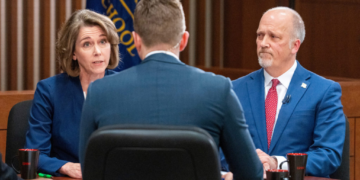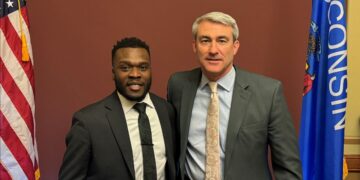U.S. Senator Tammy Baldwin’s recent support for bringing Gaza refugees into the United States has drawn strong criticism, particularly from her GOP rival, Eric Hovde.
Baldwin, a Democrat from Wisconsin, has publicly backed the Biden administration’s plan to allow Palestinian refugees into the U.S. In her statement to POLITICO, Baldwin emphasized America’s tradition of offering refuge to those fleeing war and persecution. She assured that these refugees would undergo thorough vetting to ensure they are not a threat to Americans. However, her opponent argues that trusting this vetting process is problematic.
Baldwin’s support stems from a recent White House announcement that Palestinians currently in the U.S. will be protected from deportation due to the deteriorating conditions in Gaza and will be able to sponsor family members in Gaza to come to the US as refugees. This protection, known as “deferred enforced departure,” allows Palestinian immigrants who would otherwise face deportation to stay in the U.S. for 18 months. While this measure aims to provide a temporary haven, it also sets a precedent that could lead to an increase in the number of refugees admitted into the country.
In a video, Hovde explain the process and consequences of Baldwin’s support for allowing in Palestinian refugees. He rightfully explains that, once refugees are granted temporary protection, they can eventually apply for permanent residency and, within five years, become citizens. As citizens, they would have the right to bring their family members to the U.S., potentially leading to a substantial increase in the refugee population. This chain migration affect could overwhelm the current immigration infrastructure and pose additional challenges to national security.
Hovde also noted that countries in the Middle East, including Egypt, Jordan, and Saudi Arabia, have refused to take in Palestinian refugees. If these nations, which are geographically and culturally closer to the Palestinian territories, are unwilling to accept these refugees, Hovde questioned why the U.S. should take on this responsibility.
Hovde further argued that the U.S. should prioritize its own citizens’ safety and well-being over taking in refugees from a region known for its anti-American sentiment. He suggested that the administration’s focus should be on strengthening national security and addressing the existing challenges within the immigration system rather than introducing new complications.
The decision to bring Gaza refugees into the U.S. has also raised concerns about the potential long-term implications. Opponents like Hovde fear that the policy could lead to security risks if the vetting process fails to identify individuals with extremist views. Additionally, the economic burden of supporting an influx of refugees and their families could strain public resources and services.
NRSC spokesman Tate Mitchell criticized Baldwin, claiming she is more interested in appeasing the radical fringes of her party than in safeguarding American security. He pointed out that this policy comes at a time when pro-Hamas Palestinians are chanting “Death to America,” suggesting that bringing them to Wisconsin could be a serious threat.



























